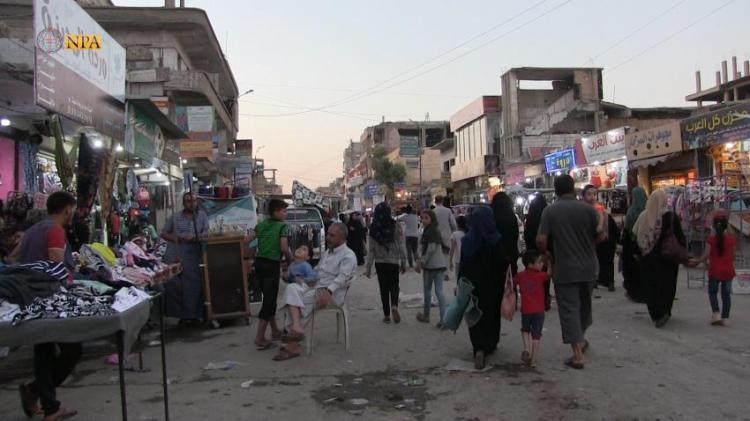Raqqa-North-Press Agency -Ahmad Al-Hassan
On the eve of Eid Al-Adha, the markets of the city of Raqqa in northeast of Syria are witnessing a large turnout by people and a crowded movement of buying and selling, as desserts and clothing shops are crowded with shoppers, to prepare the hospitality and buy new clothes for the second feast of the Muslim world.
Eid al-Adha this year is special and is distinguished from the previous ones of the past years, “The Eid atmosphere is delightful and the markets are witnessing a good movement, compared to the years where ISIS was in control,” said Abdulqader Muhammad, a resident of Raqqa, noting that the movement of work has become better as security and stability prevail gradually the city.
For his part, Hamoud Al-Su’oud, an owner of a dessert shop, explained that the buying and selling movement is “strong due to the availability of goods and a slight decrease in prices.”
Arabic coffee is the main hospitality for people of Raqqa during Eid days, while women work to make all kinds of home pastries in addition to many types of sweets and cookies, to be a feature which the Eid is famous for in the city and other areas as well.
Iman Al-Asaad, a local resident of Raqqa explained that she does not buy ready-made sweets, “I make them at home at all holidays, so I came to the market to buy the requirements and ingredients for making them.”
While Nayef Al-Sayel, one of the shoppers said: “Raqqa is witnessing a wonderful atmosphere this Eid, because safety prevails, and all kinds of required goods are available.”
For his part, Mustafa Mahmoud, an owner of a children’s clothing store, told North-Press that Eid time is considered to be the busiest during the whole year as “parents buy clothes, especially for children.”
However, the high prices of goods and other materials, as they are related to the dollar exchange rate, which has reached record levels, in addition to the customs duties imposed by the Autonomous Administration on goods entering the city of Raqqa, have weakened purchasing power by some low-income people, and led them to buying second-hand clothes.

